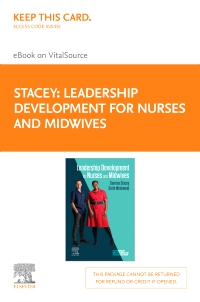
Leadership Development for Nurses and Midwives - Elsevier E-Book on VitalSource (Retail Access Card), 1st Edition
Elsevier eBook on VitalSource - Access Card

Edited by the CEO and Director of the prestigious Florence Nightingale Foundation and written by specialists in their field, the book focuses on the personal development required for nurses and midwives to become authentic leaders. It guides the reader through a range of innovative and novel perspectives on leadership development, with an emphasis on self-awareness and personal growth
Leadership Development for Nurses and Midwives offers an exciting new perspective that is sure to maximize the individual and collective influence of nurses and midwives, and all that each has to offer.
-
- Increases awareness of how personality preferences influence personal effectiveness and performance in teams
- Shows how to identify opportunities to influence and how to express yourself for impact
- Supports personal resilience and how to stay calm under pressure
- Brings theory to life through authentic case studies provided by current nursing and midwifery leaders working in a range of settings
- Reflects contemporary practice and responds to identified gaps in leadership development for nurses and midwives
- Reflective learning activities encourage the reader to apply principles to their own self-development
- Presents historical references to Florence Nightingale and her relevance to modern day nursing throughout
-
1. Florence Nightingale and Her Legacy Today
2. Understanding Self for Effective Leadership
3. Developing Presence and Having Impact
3..1 Developing the Confidence to Lead
3..2 Stepping Into Your Authority: Pillars of Presence
4. Creating Psychologically Safe Spaces: A Peer Coaching Approach
5. Leading in Anxious Times
6. Gaining Political Acumen, Having Influence, and Making Change Happen
7. The Art and Science of Influencing Change and Measuring Its Impact
8. Empowering Nurses and Midwives to Be Digital Health Leaders
9. Sharing Knowledge and Establishing Expertise Through Writing for Publication

 as described in our
as described in our 